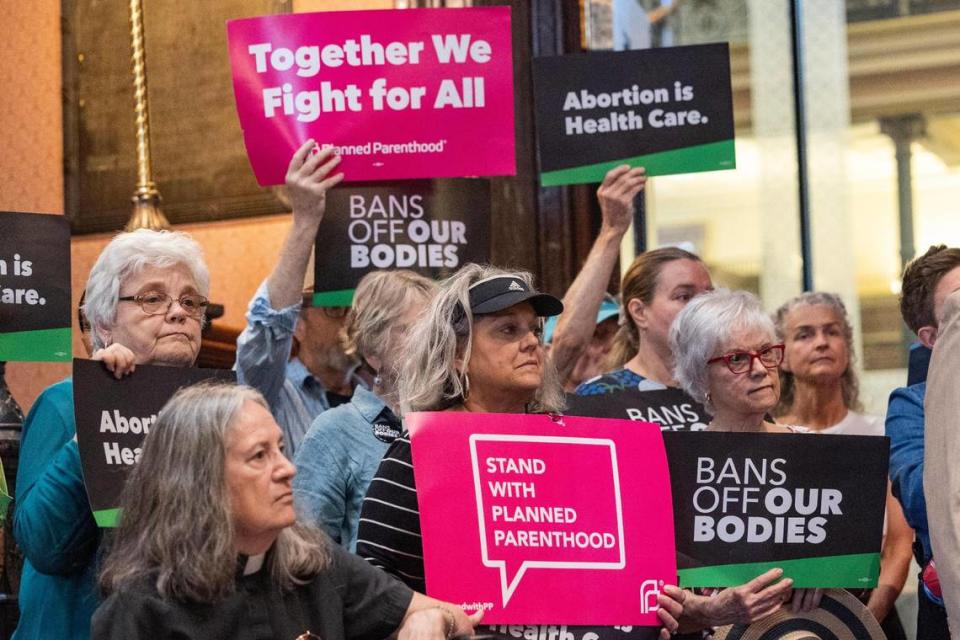SC’s 6-week abortion ban faces heat in Supreme Court arguments as state seeks to defend it
For the second time in less than a year, the South Carolina Supreme Court is considering constitutional challenges against a six-week abortion ban critics say unduly burdens a woman’s right to reproductive care.
The S.C. Supreme Court, made up of five male justices, on Tuesday heard oral arguments over whether a revived six-week abortion ban in South Carolina violates a woman’s right to privacy under the state’s constitution. For now, the abortion ban remains temporarily suspended as the court continues to mull its constitutionality. In the meantime, the state’s previous ban at about 20 weeks remains in effect.
Tuesday’s hearing serves as the latest battle in a years-long war over how restrictive abortion access should be in South Carolina. In May, shortly after the General Assembly passed a six-week abortion ban that would prohibit abortions once fetal cardiac activity is detected — S. 474 — Gov. Henry McMaster signed the bill into law.
Plaintiffs, including Planned Parenthood South Atlantic, the Greenville Women’s Clinic and two physicians who provide abortions in South Carolina, argued the ban is essentially a replica of a previous six-week abortion ban — S. 1 — that was struck down as unconstitutional by the state Supreme Court in January and, for that reason, S. 474 is also unconstitutional.
Indeed, the court wasted little time Tuesday in pressing the state on how the now-contested law differs from the previous ban.
“I want you to pinpoint exactly the material differences between the 2021 act and this court’s decision in January and the current 2023 act, and tell us how those reported differences impact our analysis on Article One, section 10,” said state Supreme Court Justice John Kittredge.
Article One, section 10 of the South Carolina Constitution, which provides a right to privacy, is what the court previously relied on in nullifying S. 1. In its majority opinion striking down the state’s previous law, the Supreme Court said including a finding about a woman’s “informed choice” was contradictory to other provisions within the ban.
Lawyers for the state said to address the court’s previous concerns regarding the ban, the legislature made three changes to the law by: one, repealing a legislative finding involving a woman’s informed choice to receive an abortion; two, changing the definition of a clinical diagnoseable pregnancy; and three, changing the definition of contraceptives to clarify that contraceptives are permissible under the new law and include emergency contraceptives that would be technically available after conception.
Lawyers from Planned Parenthood on Tuesday asked the justices “not to create ... an arbitrary line in determining pregnancy, but to look at this Court’s precedent and claim from day one that (S. 474) is an unreasonable invasion of privacy,” attorney Catherine Humphreville said.
The contested law bans abortions at around six weeks of pregnancy, or once fetal cardiac activity is detected, at a time when most people don’t know that they’re pregnant. With only three small abortion clinics in South Carolina — Charleston, Columbia and Greenville — plus an appointment backlog and new requirements to get an abortion, abortion-rights backers say the law is essentially a near-total ban.
Tuesday’s hearing lasted about 70 minutes and was marked by active participation by all five male justices. Among them, they peppered the lawyers with dozens of questions on topics ranging from obscure legal terms such as “collateral estoppel” to practical situations such as how much time a woman would have between her recognition of being pregnant and being able to get an abortion.
Chief Justice Don Beatty took perhaps the most active role in questioning the two attorneys for the state, Thomas Hydrick and Grayson Lambert, repeatedly taking issue with their characterizations of numerous matters in the case.
Early in the hearing, Assistant Deputy Solicitor General Thomas Hydrick told the justices that “women can know as soon as seven to 10 days after conception that they are pregnant, and that would still leave a period of certain weeks for them to make a decision (whether to have an abortion). ... I think a woman can know they are pregnant by that time. …We also know as a matter of statistics and evidence they do know they are pregnant by that time.”
Beatty objected: “Where is this evidence? We keep talking about the evidence. There’s not one shred of evidence admitted in this record.”
While certain features of Tuesday’s hearing seemed familiar, such as the woman’s privacy issue, the court’s makeup did not.
In February, the General Assembly voted to replace retiring Justice Kaye Hearn — who, before reaching the state-mandated retirement age of 72, was the only woman on the bench — with Judge Gary Hill, marking the first time in more than three decades the high court would not have a female justice on the bench.
Hearn wrote the court’s majority 3-2 opinion against the previous abortion ban in January, which also included state Supreme Court Chief Justice Donald Beatty and Justice John Few. Justices John Kittredge and George James dissented.
The now-contested law capped months of Republican infighting over abortion restrictions following the U.S. Supreme Court’s 2022 Dobbs decision, after the state House last year first passed its own ban at conception and refused to debate the Senate’s proposed six-week ban, despite an unwillingness by the upper chamber to pass a total ban on abortion Both chambers passed similar versions of a six-week ban this year and, after a months-long standoff, the House agreed to the Senate’s proposal.
Last month, Senate Majority Leader Shane Massey, R-Edgefield, highlighted state health data that showed, at the previous 20-week ban, South Carolina reported 6,279 abortions in 2021 and 7,277 abortions in 2022 — an increase, in part, due to out-of-state visitors from states with stricter abortion restrictions.
This is a developing story and will be updated.
John Monk contributed reporting.


